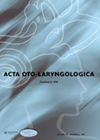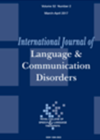
Journal Reviews archive for 2017
Should we reconsider induction chemotherapy in advanced stage laryngeal cancer?
Use of chemo-radiotherapy for advanced laryngeal cancer led to a major shift in treatment as an alternative to total laryngectomy. Despite widespread adoption of chemoradiotherapy, survival rates have not improved and the original premise of matching neoadjuvant chemotherapy tumour response...
A comparison of same day with staged bilateral cartilage graft tympanoplasty for tubotympanic CSOM
This randomised, controlled study compares the tympanoplasty outcomes in two groups of patients: one undergoing bilateral tympanoplasty on the same day (18 patients, 36 ears) and the other having the same procedure done on different days, with a gap of...
How does the Dizziness Handicap Inventory (DHI) correlate with demographics and symptoms of patients?
The DHI is widely used to assess the self-perceived emotional, functional and physical disability in subjects with dizziness and balance problems. By studying the data of 568 patients retrospectively, the authors sought to determine the gender and age differences in...
Previous radiotherapy does not cause worse outcomes in patients with differentiated thyroid cancer
Radiation exposure from nuclear incidents, especially in childhood, is known to increase the risk of thyroid cancer. This large retrospective study from the Memorial Sloan Kettering Cancer Centre sought to determine if thyroid cancers in patients with prior exposure to...
Should intratympanic steroids be the first line treatment for sudden sensorineural hearing loss?
This article looked at whether intratympanic steroids (ITS) provide more benefits over systemic steroid therapy (SST) as initial therapy in patients with idiopathic sudden sensorineural hearing loss (ISSHL). This meta-analysis study, based on published RCTs, concluded that ITS treatment exhibited...
Cochlear implantation in children with cognitive disabilities
Additional disabilities are frequently encountered in children born with hearing loss or deafness. A study from Denmark attempted to systematically review to what extent hearing-impaired children with cognitive disabilities benefit from cochlear implantation. The authors conducted an extensive search in...
Less pain more gain: impact of prophylactic gabapentin on swallowing outcomes in head and neck cancer patients undergoing radiation treatment
Patients planned for chemoradiation to the head and neck are usually advised to expect some pain and soreness during their treatment and that pain relief will be offered as and when it is required. Uncontrolled pain and mucositis affect oral...
Surgery or medicine: when should we stop trying to be conservative?
Although most otolaryngologists would agree that surgery improves the outcomes of patients with CRS when medical treatment has failed, both Cochrane reviews state that there is no proof of improved efficacy of surgery over medicine – however, that was after...
Medical control of allergic rhinitis in children
The authors of this randomised trial aim to answer an important question – which is better: daily versus on demand use of intranasal steroids (fluticasone probionate) or antihistamines (levocetirizine dihydrochloride) for symptomatic control of allergic rhinoconjunctivitis secondary to pollen? The...
eNOS and OME
The pathophysiology of otitis media with effusion (OME) is multifaceted. The authors tackled the nitrous oxide (NO) and platelet activating factor (PAF) pathways and the genetic polymorphism of endothelial nitrous oxide synthetase (eNOS). DNA analysis by PCR and restriction fragment...
Oral hygiene and its interaction with standard of education on the risk of oral cancer in women
Oral cancer in women has an increasing incidence in China, although the majority of Chinese women don’t smoke or drink alcohol. Poor oral hygiene has been shown in previous studies to be a risk factor in the development of oral...
PACT or Partners of Aphasic Clients Conversation Training
There is an increasing recognition that families and caregivers of patients require special training to manage their wards. PACT or Partners of aphasic patients Conversation Training is an initiative which aims to improve awareness of methods of communicating with aphasic...

















